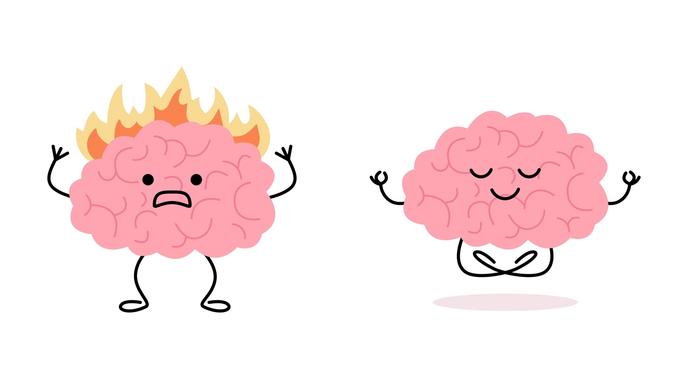5 Ways to Reboot Your Brain During Your Lunch Break
Every workday is a marathon for your brain. From the moment you wake up to the time you clock out, it’s processing tons of information, making decisions, solving problems, and adapting to constantly changing circumstances.

It's no surprise that by the end of the day, you feel like a squeezed lemon, scattered, and with a serious case of brain fog. Is there a way to avoid this? Or better yet, to prevent it altogether? We all crave that feeling of freshness when we get home, or if you've got a mountain of tasks lined up for the afternoon, yet you're already fried by lunchtime. How can you restore your energy and intellectual resources when you only have half an hour?
Why Does Our Brain Get Tired? A Little Science of Fatigue

To understand how to reboot your brain, it's crucial to understand what's going on during its "working hours." Fatigue is a complex process that touches on many aspects of brain function, from neurochemical reactions to cognitive processes. So, the way you feel at the end of the day is due to a whole host of factors:
-
Neurochemical Imbalance: Your brain constantly uses neurotransmitters like dopamine, serotonin, and norepinephrine to pass signals between nerve cells. Active work without breaks, which gets even more active during periods of stress (because you need to react quickly and make decisions fast), leads to the depletion of these same neurotransmitters, which in turn causes fatigue.
-
Metabolism: The brain needs a huge amount of energy to function. Glucose is the primary fuel source for neurons. Prolonged mental activity can lead to a drop in blood glucose levels, which impairs cognitive functions such as memory and attention (that's why we often crave something sweet during intense mental work).
-
Stress and Cortisol: Elevated stress levels trigger the production of cortisol - the stress hormone, and chronically high cortisol levels impair cognitive function.
-
Synaptic Plasticity: The brain is constantly rebuilding the connections between neurons (synapses) to efficiently process information. Prolonged mental load can overload these connections, which reduces the effectiveness of learning and adaptation. This is why, for example, after intensive study - such as when we struggle for three hours over mathematical formulas - we can't even focus on one thing the next day.
Consequently, your lunchtime routine should be directed towards working with all of these factors at once: reducing stress, training plasticity, etc.
Reboot Your Brain in Minutes!
We're incredibly lucky that the brain has an amazing ability to recover. Even a short break can significantly impact its performance. The essence of rebooting is to switch your attention, change the context, and give your brain a chance to "rest" from the constant information processing. And lunchtime is perfect for this! Whether you've got 30 minutes or the full hour, you can make it happen. If you've only got fifteen minutes, just pick the method that's most familiar to you and give it a shot. All these methods are easy to incorporate, even into the busiest schedule.
1. Mindfulness in the Window: Reboot Through Observation

Instead of a cliché, eyes-closed meditation, try a mindfulness exercise using the world outside your window. It's a simple and effective way to shift your focus and "ground" yourself in the present moment. Here's how it works: Focusing on the details of your surroundings stimulates your sensory perceptions and activates other areas of the brain unrelated to analytics and critical thinking, thus giving a break to our main "workhorses." It's easy to do:
-
Go to the window: Choose a window with the most interesting view, for example, a park or the porch of a house.
-
Find five things, of any color: Describe each of them: the shape, visual texture, the shade, how that thing appeared there, how it's used, etc. Then repeat with other colors.
-
Observe the people: Choose a random passerby and describe them. What are they wearing? How are they moving? What's their facial expression? Try to imagine what they're doing and where they're going.
-
Assess the architecture: Pay attention to the buildings around. What architectural features do they have? What materials were used? What style?
-
Ask yourself questions: Constantly ask yourself questions about what you see. Why does the tree grow that way? What is the purpose of this sign? What is that sound?
2. Movement: Short Physical Activity
Physical activity is one of the most effective ways to combat brain fatigue because our body switches from mental to physical work. It also improves blood circulation, saturates the brain with oxygen, and stimulates the production of endorphins. That's why it's recommended to exercise at least twice a week - it's also a great way to combat emotional burnout and depression. Here's how it works: By increasing blood flow, exercises improve the nutrition of neurons and promote the production of BDNF (brain-derived neurotrophic factor) - a protein that plays an important role in forming new neural connections. Try this:
-
Take a walk. Going for coffee or tea? Instead of just walking to the vending machine in the hallway, stroll over to a nearby cafe. Try not to walk at a fast pace, to stretch the walk to 20 minutes. Also, try to find a route through green spaces - green landscapes reduce stress.
-
Climb the stairs. And descend them too, instead of taking the elevator. You can even do it several times if you have the strength.
-
Dance! Why not have your colleagues join you? This can become a fun tradition! There are also special dance exercises on YouTube if you want to justify your dancing.
3. Silence and Nature Sounds: Rest for your Sensory Channels

Often fatigue is caused by excessive stress on our sensory channels, namely vision and hearing. It's otherwise called sensory overload; most often, it occurs after dense and prolonged interaction with people and in people who are initially sensitive and empathetic. It's necessary to reduce the activity of your sympathetic nervous system (which is responsible for the "fight or flight" response) and to activate the parasympathetic nervous system (responsible for rest and recovery) instead. For this:
-
Cover your eyes or cover them with something. A sleep mask or even a scarf, hat, or maybe sunglasses under which you'll just close your eyes will do.
-
Put on headphones. It's also advisable to hide somewhere in a quiet and secluded place where you won't be pestered and where external noise itself is minimal.
-
Turn on sounds that promote relaxation. For example, the sound of wind, birds chirping, the murmur of water, a gentle, unobtrusive melody for meditation, or meditation itself.
-
Assume a comfortable position and, if possible, take a short nap. So what if you're already an adult? Who doesn't love an afternoon nap, right? You can take a nap even at your desk, folding your arms and putting something soft on them, and then your head on top. Or else, sitting in an armchair or on a couch. In many offices, this practice is widespread. Falling into deep sleep is also not necessary - even a state of semi-sleep or ordinary calm under the sounds of crackling fire will reboot you.
Don't forget to set an alarm before this!
4. Let the Games Begin: Have Fun and Relax!
Forget about work reports and spreadsheets! It's time to switch your brain to something fun and exciting. Games are a natural mechanism that we actively engage in as children, but that we forget about as adults. Through games, children not only learn about the world but also process the information they receive, which is exactly what you need - to process the information that you got during the day and that caused you to feel tired. In addition, during games, other areas of the brain that are not related to work are activated, i.e. this is also a neurophysical switch.
Try to offer a game to a colleague. "Battleship," "Tic-Tac-Toe," "Truth or Dare" and any games in which you have to play in pairs are not only a great way to switch attention, but also good for strengthening relationships. And what if someone else wants to join you? Why not play something with the whole office during lunch? Then board games are suitable - choose those that can be interrupted at any moment and continued later, for example, the next day. Ideally, they should also involve fine motor skills. For example, Jenga.
Important! Reject online games and games on your smartphone - this is not suitable. Since your work, most likely, already takes place behind the computer for most of the time, such a change of activity will not bring results: the brain will perceive any time spent behind the computer as work. And you need to switch. Therefore, games should be verbal or physical, engaging other skills that you don't use in the usual way, such as drawing. Coloring, by the way, works too!
5. Voice and Reading Aloud: A Kind of Meditation
If you're tired of listening to all sorts of extraneous sounds, then try reading aloud. This is not only a way to expand your horizons (you can read any books, even specialized and educational ones), but also a useful defocusing of attention, when, in addition to the content, you also pay attention to your speech, articulation, and engage the auditory channel of perception. However, an important nuance: if you already do something similar on a daily basis (if you are, for example, a teacher), this method of switching will not work. It is suitable for IT specialists, analysts, etc. Here's what you need to do:
-
Choose a text. It should be interesting, but not too difficult. Also, it shouldn't be familiar to you. This can be an excerpt from a book, an article from a magazine, or even a poem.
-
Find a quiet place. Or make sure that your colleagues don't mind you reading aloud. Just moving your lips is not enough - you must be able to hear your voice well, as during a dialogue with someone.
-
Read slowly and consciously, trying to pronounce each word clearly and expressively. Pay attention to intonation and punctuation. Make sure that you don't swallow words, that you place the correct accents, follow punctuation, etc. If you have listeners (say, colleagues), make sure that they understand everything and are satisfied with the quality of reading. Follow the rhythm and breathing!
Important! Try reading in another language, this is even better for switching. The main thing, of course, is that you know this language, if not perfectly, then at a level sufficient for understanding and practicing diction.
Rebooting your brain is, of course, not a button you can just click to instantly feel refreshed and rested. And yet, it's real to reboot right during the workday to return to performing work tasks with renewed vigor. Remember that quality rest is, above all, an investment in your future, because your effectiveness depends on it. Implement these techniques into your workday and see how your well-being changes!
Share this with your friends via:
Latest News

A significant stage in the development of the alternative education system has begun in West Northamptonshire in the UK: the County Council is actively calling on parents, guardians, and trustees to participate in shaping the future of this key area.

Outwoods Primary School in Atherstone, Warwickshire, having experienced deep sadness after the loss of their famous cat, Silla, has found solace in a new pet – a Maine Coon named Aloysius O’Hara.

In modern universities, artificial intelligence, and in particular ChatGPT, is rapidly transforming from a controversial tool into a full-fledged student assistant.

An innovative educational project is gaining momentum in UK primary schools, aiming to change attitudes towards video games.

The Massachusetts Institute of Technology (MIT) presents MIT Learn – a revolutionary online platform that opens a “new front door” to access university knowledge and resources.












 Test: What Business is Right For You?
Test: What Business is Right For You?
 “I’m Here for the Long Haul”: When Loyalty to a Company Becomes Toxic
“I’m Here for the Long Haul”: When Loyalty to a Company Becomes Toxic
 Freelancing, Remote Work, Office Jobs, or Consulting: How to Choose the Work Format That’s Right for You
Freelancing, Remote Work, Office Jobs, or Consulting: How to Choose the Work Format That’s Right for You
 Test: How Prone Are You to Abusive Behavior as a Manager?
Test: How Prone Are You to Abusive Behavior as a Manager?
 Test. What superpower would you possess if you were a superhero?
Test. What superpower would you possess if you were a superhero?
 Test. What Should You Let Go of Before Winter Ends?
Test. What Should You Let Go of Before Winter Ends?
